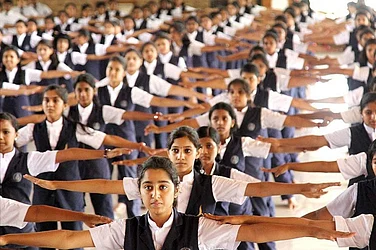The Noida twin towers demolition on Sunday raised environmental and health concerns for people living in the area as dust from the demolition would worsen the air quality for days to come and is feared to cause respiratory issues in people.
The Noida twin towers were demolished around 2:30 pm on Sunday, producing a large cloud of dust that enveloped the entire area and took several minutes to clear. Water-sprinklers and anti-smog guns were immediately started to wash down the dust in the air.
Despite the efforts, its expected that the air would remain laden with heightened amount of fine particles of days to come, which is expected to cause respiratory issues to people. It is also expected to worsen the air quality in the National Capital Region (NCR), which is already among the most polluted regions in the world
Here we explain what are the health concerns, what experts are saying, and how you may safeguard yourself in the area.
Noida twin towers demolition's health concerns
While respiratory issues might see a spike, burns are possible from contact with debris and dust-laden air. Eye and skin irritation is also possible.
"Definitely, the demolition will add to the PM10 particles, which is a matter of concern. There might be other toxic pollutants as well," said Dr Pratima Singh of Centre for the Study of Science, Technology and Policy to Moneycontrol.
While finer PM2.5 will also be affected, the primary rise would be in PM 10 scale as coarse concrete is being blasted.
“Because a large amount of concrete will be blasted, there certainly will be a high concentration for PM10 for a few days. PM 2.5 levels will be impacted, but more PM 10 will be released. Because it is concrete, coarser particles are going to be emitted more,” said Dr Sachchida Nand Tripathi of IIT Kanpur to The Quint.
Dr Adarsh Subrahmanyam Koppula said dust clouds from cement mixture could also cause alkaline burns.
"Dust clouds have the consistency of talcum powder. This has a mixture of iron oxides and cement, which can cause alkaline burns. Due to the presence of sand, coupled with heat, we may see crystalline silica, which may lead to lung problems like silicosis over a long period of time," said Dr Koppula.
Alkaline burns can cause serious damage in a very short time as they can penetrate through the skin and damage the deeper layers.
The elderly and the children are at a higher risk during the period that Noida is under the influence of these dust clouds. Experts have said that children should not be taken to the are for three days if possible.
How long is dust expected to be there
The duration depends on several factors such as wind, humidity, and rainfall. If it rains, the situation would improve as dust would be washed away.
There is a high possibility of rainfall in Noida on Tuesday, according to Skymet, which could help with the situation.
Dust cloud is expected to move towards Greater Noida and Bulandshahr in Uttar Pradesh as the wind is blowing eastward on Sunday. For the past one week, the wind was blowing westward which could have taken the dust cloud to Delhi.
PTI quoted officials as saying that wind direction towards the west would have been more favourable as the dust cloud and particles would have flown towards an open park instead of the residential parks behind the twin towers.
Buildings around Noida twin towers were wrapped in protective coverings to shield them from the dust and debris from the demolition. Visuals of the arrangements have surfaced, whose primary function is to prevent the dust from demolition to enter people's homes.
Arrangements in place to deal with health concerns
The authorities as well as medical fraternity is well aware of the risks associated with the Noida twin towers demolition. This is why hospitals in the area had been alerted prior to the demolitions.
Hospitals were prepared for any untoward incident that might have happened during the demolition and are now prepared for any post-demolition situation. These hospitals are Jaypee Hospital, Felix Hospital, and Government Institute of Medical Sciences (GIMS) in Noida, according to India TV.
In the wake of the demolition, Dr DK Gupta, Chairman of Felix Hospital, said that if a person gets breathings issues, sees a fall in oxygen level below 92, experiences chest pain, redness in eyes, skin issues, headaches, or fluctuating blood sugar levels, then they must contact a doctor.
Besides this, the authorities are also monitoring air quality and Edifice, the company that carried out the demolition, would also be submitting reports on the effects on air quality, according to reports.
How to protect yourself from dust
As children and the elderly are the most vulnerable because of delecate and weak organs and immune systems, it's best if they could stay away from the area for a few days until the dust settles. If that's not possible, then they should stay indoors, their health should be monitored, and a dust-free environment should be ensured inside the houses.
If available, air purifiers and air conditioners should be used and filters might be checked and replaced.
Doors and windows of houses should be closed. Experts have also said that curtains, carpets, and floor should be washed after the demolition to ensure there is no dust inside the house. It's important that you don't do "dusting" with a cloth as it will dispense dust in the air.
"Do not do dusting with a cloth or duster, try wet mopping or vacuum cleaning only. Because dusting will only disperse the settled dust back into the air. To remove the dust permanently from your house, use wet mopping or vacuum cleaning," Dr Ashish Jain of Max Super Specialty Hospital wrote in Hindustan Times.
Dr Jain also lists the following tips:
- Asthma, COPD, or other lung-related disease patients on Inhalers can take a few puffs for a few days following the demolition
- Basic hygiene is a must – washing hands and face regularly and possibly an extra bath a day
- Keep yourself well hydrated
- Eat fresh fruits but ensure they are properly washed and cleaned


























